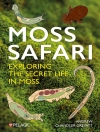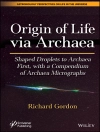The book emphasizes role of functional microbes in soil to improve fertility and plant health in agro-ecosystem. In this compendium main emphasis is on occurrence and distribution of microbial communities, In situ active microbial quorum in rhizosphere, metratranscriptomics for microflora- and fauna, and fnctional diversity in rhizosphere. The book also highlights the importance of PGPRs in rhizosphere, root endotrophic microbes, functional niche under biotic stress, functional niche under abiotic stress, functional root derived signals, as well as functional microbe derived signals. Approaches deployed in metatranscriptomics, and molecular Tools used in rhizosphere are also discussed in detail. The book presents content is useful for students, academicians, researchers working on soil rhizosphere and as a policy document on sustenance of agriculture.
Mục lục
Chapter 1. Metatranscriptomics in Microbiome study: A comprehensive approach.- Chapter 2. Molecular Tools to Explore Rhizosphere Microbiome.- Chapter 3. Relevance of metatranscriptomics in symbiotic associations between plants and rhizosphere microorganisms.- Chapter 4. Chemical Signal Dissemination through Infochemicals.- Chapter 5. Nitrogen fixation through genetic engineering: A future systemic approach for Nitrogen fixation.- Chapter 6. Functional AM fungi in the rhizopshere of fruit crops.- Chapter 7. Importance of PGPRs in rhizosphere.- Chapter 8. Flavonoid Infochemicals: Unraveling insights of rhizomicrobiome interactions.- Chapter 9. Augmenting the abiotic stress tolerance in plants through microbial association.- Chapter 10. Role of functional defense signal in plant -microbe interactions.- Chapter 11. Understanding rhizosphere through metatranscriptomics approaches.- Chapter 12. Rhizospheric microbial communities: occurrence, distribution and functions.- Chapter 13. Psychrotrophic Microbes: Biodiversity, Adaptation, and Implications.- Chapter 14. Significance of belowground microbial-rhizoshphere interactions.- Chapter 15. Functional niche under abiotic stress.- Chapter 16. Functional Diversity in Rhizosphere Microbial Community: Concept to Applications.- Chapter 17. Epiphytic Microbes of roots: Diversity and Significance.- Chapter 18. Evaluation of dynamic microbiome ecology within the plant roots.- Chapter 19. Maneuvering Soil Microbiome And Their Interactions: A Resilient Technology For Conserving Soil And Plant Health.- Chapter 20. Exploration of Rhizospheric Microbial Diversity of the Indian Sunderbans – a World Heritage Site.- Chapter 21. Advances and challenges in metatranscriptomic analysis.- Chapter 22. Metatranscriptomics: A Promising Tool to Depict Dynamics of Microbial Community Structure and Function.- Chapter 23. A pipeline for assessment of Pathogenic Load in the Environment using Microbiome Analysis.- Chapter 24. High Throughput analysis to decipher bacterial diversity and their functional properties in fresh water bodies.- Chapter 25. Functional defense signals in plants.- Chapter 26. Metatranscriptomic: A recent advancement to explore and understand rhizosphere.- Chapter 27. Advances in Biotechnological tools and techniques for metatranscriptomics.- Chapter 28. Microbes and soil health for sustainable crop production.- Chapter 29. Molecular Mechanisms Deciphering Cross-Talk Between Quorum Sensing Genes And Major Iron Regulons In Rhizospheric Communities.- Chapter 30. Exploring the Potential of Below ground Microbiome: Mechanism of action, Applications & Commercial Challenges.- Chapter 31. Plant growth promoting bacteria (PGPB) – a new perspective in abiotic stress management of crop plants.
Giới thiệu về tác giả
Manoj Nath (Ph.D.), Scientist, ICAR-Directorate of Mushroom Research, Solan, Himachal Pradesh (173213), India
Dr. Nath presently working as Scientist, ICAR-Directorate of Mushroom Research, Solan, Himachal Pradesh. He worked as an Assistant Professor, Amity Institute of Microbial Technology, Amity University Uttar Pradesh, Noida, Uttar Pradesh. Besides, showed responsibility as principal investigator to DST-SERB-Early Career Research Award. He spent several years as post-doctroal research scientist at various renowned places in India including ICGEB.
Deepesh Bhatt (Ph.D.), Assistant Professor at Department of Biotechnology, Shree Ramkrishna Institute of Computer Education & Applied Sciences, Veer Narmad South Gujarat University, Surat, Gujarat, India
Dr. Bhatt shows his responsibility as an Assistant Professor at Department of Biotechnology, Shree Ramkrishna Institute of Computer Education & Applied Sciences, Veer Narmad South Gujarat University, Surat, Gujarat, India. His area of research include plant-stress biology with major focus on cloning and expression of abiotic stress induced genes, Generation and validation of transgenic plants by Agrobacterium mediated transformation, Nano biotechnology for yield enhancement and effect on secondary metabolites under abiotic stress.
Prachi Bhargava (Ph.D.), Associate Professor, Institute of Biosciences and Technology, Shri Ramswaroop Memorial University, Barabanki, Uttar Pradesh, India
Dr. Bhargava has over 16 years of teaching and research experience in microbial molecular biology and is currently working as an Associate Professor at Shri Ramswaroop Memorial University, Lucknow. She has worked as Principle Investigator on various major GOI-sponsored projects, and was recently involved in a project sponsored by SERB, New Delhi. As an active researcher, Dr Bhargava has published numerous research and review articles in respected journals, along with several book chapters
D. K. Choudhary, Ph.D., Amity Institute of Microbial Technology, Sector 125, Noida, Uttar Pradesh-201313
Dr. Choudhary is a member of the National Academy of Sciences (MNASc), India. He holds a Ph D in Microbiology and is currently working as an Associate Professor at Amity University, Noida. Dr. Choudhary has worked as Principle Investigator on major GOI-sponsored projects. He has published over 87 research articles for resepcted national and international journals, as well as several major review articles and chapters in books. He has also edited more than 10 books sponsored by Springer Nature.












